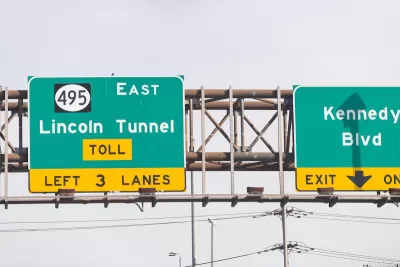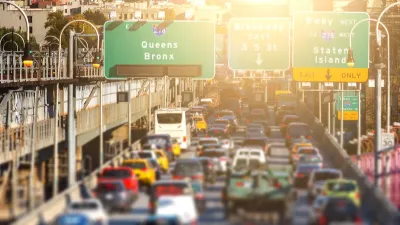Gov. Hochul says New York City will “keep its cameras on.” Can the administration legally end the nation's first cordon pricing program?

In a piece for Slate, Henry Grabar analyzes the Trump administration’s legal defense for its decision to revoke federal approval for New York City’s congestion pricing program, a move decried by transit activists and New York Governor Kathy Hochul.
In a letter to the governor, Transportation Secretary Sean Duffy pointed to “the lack of toll-free alternative routes and the program’s focus on raising money for mass transit” as reasons to rescind approval.
According to Grabar, the lack of free alternatives is a moot point. “It’s an unsupported theory that seems to open up the question of whether New York must build a free bridge to New Jersey, since all six of the crossings between the states have always been tolled,” Grabar points out.
Roderick Hills Jr., an expert in administrative law at New York University, told Grabar that the reversal is “surprisingly unjustified,” adding, “It’s a complete fabrication devoid of any support in the statutes.”
One silver lining: the decision seems to have shored up approval for the program — and for Kathy Hochul, who last year put a pause on the program for six months until coming up with a lower toll cost. Law professor Greg Shill says the city should “seize the levers it already controls” to “maximize the welfare of its own people” through interventions it can control like bus lanes, traffic enforcement, bike lanes, and pedestrian infrastructure.
FULL STORY: Revenge of the Bridge-and-Tunnel President

Manufactured Crisis: Losing the Nation’s Largest Source of Unsubsidized Affordable Housing
Manufactured housing communities have long been an affordable housing option for millions of people living in the U.S., but that affordability is disappearing rapidly. How did we get here?

Americans May Be Stuck — But Why?
Americans are moving a lot less than they once did, and that is a problem. While Yoni Applebaum, in his highly-publicized article Stuck, gets the reasons badly wrong, it's still important to ask: why are we moving so much less than before?

Research Shows More Roads = More Driving
A national study shows, once again, that increasing road supply induces additional vehicle travel, particularly over the long run.

Which US Rail Agencies Are Buying Zero-Emissions Trains?
U.S. rail agencies are slowly making the shift to zero-emissions trains, which can travel longer distances without refueling and reduce air pollution.

San Diego School District Approves Affordable Housing Plan
The district plans to build workforce housing for 10 percent of its employees in the next decade and explore other ways to contribute to housing development.

Lawsuit Aims to Stop NYC’s ‘City of Yes’ Zoning Reforms
A lawsuit brought by local lawmakers and community groups claims the plan failed to conduct a comprehensive environmental review.
Urban Design for Planners 1: Software Tools
This six-course series explores essential urban design concepts using open source software and equips planners with the tools they need to participate fully in the urban design process.
Planning for Universal Design
Learn the tools for implementing Universal Design in planning regulations.
City of Moreno Valley
Institute for Housing and Urban Development Studies (IHS)
City of Grandview
Harvard GSD Executive Education
NYU Wagner Graduate School of Public Service
City of Cambridge, Maryland
Newport County Development Council: Connect Greater Newport





























